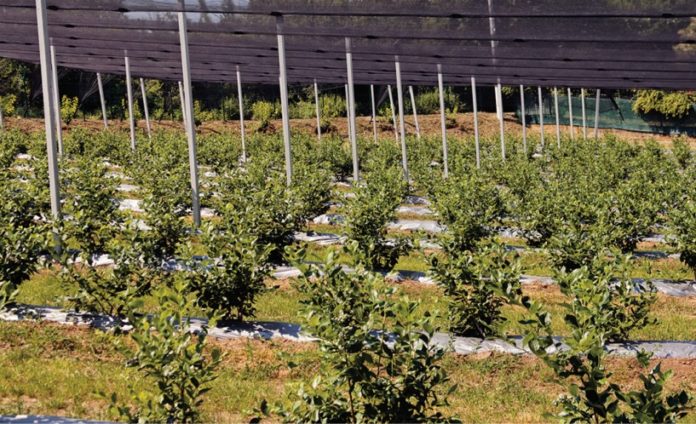The percentage contribution of Limpopo agriculture to national agriculture is 7.6% although its contribution to provincial GDP is just 2.3%. Agri-processing has enormous potential to expand in every sub-sector. The establishment of agri-parks and co-operatives and support for youth in farming are key provincial government initiatives.
Cotton growing is experiencing a renewal in the province. Companies like ZZ2 are major contributors to the country’s annual production of 120 000 tons of avocadoes. Of the current crop, about half is produced in two Limpopo regions, Letaba and Tzaneen. Exports are rising exponentially. In response to this demand, and the potential of the Chinese market, almost 1 000 ha per year of new land is being planted with avocadoes in South Africa.
The same amount of new macadamia planting is underway every year, according to the Macadamias South Africa (SAMAC), adding to the existing 19 000 ha.
The other big sellers are mangoes and tomatoes. Limpopo grows three-quarters of South Africa’s mangoes and two-thirds of its tomatoes. The Waterberg District produces large quantities of red meat, Capricorn has potatoes in abundance, Vhembe in the north specialises in citrus and subtropical fruits, Mopani has those fruits too – and the Mopani worm. The Sekhukhune region in the south-east produces grain and the marula fruit that goes into Amarula cream liqueur.

The Provincial Government of Limpopo’s nine-point economic plan includes RAAVC (the revitalization of the agriculture and agri-processing value chain).
National government’s Industrial Policy Action Plan (IPAP) acknowledges agri-processing as one of the best sectors for labour-intensive growth. In that context, the decision by Dursots-All Joy to relaunch and upgrade the tomato processing plant in Modjadjiskloof, Tzaneen, is important for the larger economy. At least 15 commercial farmers now have a ready market for one of Limpopo’s chief products and there is potential for the factory to employ as many as 300 people. There is a shortage of tomato paste in South Africa.
More support for farmers comes in the allocation of R32-million by the provincial government for the construction of the Molemole Agricultural Office in the Capricorn District Municipality. In addition to tackling drought, the Limpopo Department of Agriculture and Rural Development has had to put a strategy in place to fight Fall Army Worm.
All of South Africa’s major retailers have enterprise development programmes which connect farmers to suppliers. In Limpopo, Woolworths supports independent farmers by buying their produce and Spar channels produce from smallholders through its Fresh Assembly Point in Mopani.

Massmart’s five-year programme, which tailed off as the company focussed more on the manufacturing sector which is relevant to their main business, trained more than 700 farmers in logistics, food safety and financial management. At its peak, the programme was supporting 164 smallholder farmers.
Another example of an initiative to link farmers to markets was a Market Linkage Information Day, organised by the Limpopo Department of Agriculture and Rural Development (LDARD) in 2018 at Soekmekaar.
The Limpopo regional office of the Industrial Development Corporation (IDC) has helped expand the province’s agricultural sector by supporting the creation of two blueberry operations near Tzaneen. Tzaneen Blueberries used its own money to establish 17.5 ha of blueberry plantations but approached the IDC to fund later stages of development. The IDC’s R13.5-million assisted in the building of a packhouse. The expansion created 62 jobs.
In terms of the Provincial Red Meat Cluster Development as a catalyst towards sustainable rural livelihoods development through livestock farming, the Nguni cattle loan project saw a total of 350 livestock breeding animals distributed in 2017/18 to 16 farms. The scheme, a partnership between LDARD, the Industrial Development Corporation and the University of Limpopo, aims to improve the quality of breeding stock. It also forms part of the development of a provincial Red Meat Cluster.
ZZ2 is the major brand of Bertie van Zyl (Pty) Ltd, which produces 160 000 tons of tomatoes per year. Westfalia is another huge enterprise, part of the Hans Merensky Group, and it is the world’s largest avocado grower. It also produces significant quantities of mango, litchi, citrus and macadamia and has three agri-processing plants in the province. Greenway Farms supplies about 45% of the fresh-market carrots consumed in Southern Africa under the Rugani brand.
The two most active agricultural companies in Limpopo are NTKLA (with its headquarters in Modimolle) and Afgri, South Africa’s biggest agricultural company, which has its headquarters in Centurion (Gauteng).
NTKLA is a shareholder in Venda Roller Mills in Thohoyandou and operates 10 grain silos, 23 retail outlets, 28 flour depots and one cold storage facility.
Additional resource links:
- Agro-Food Technology Station, Limpopo University: www.ul.ac.za
- Citrus Growers Association: www.cga.co.za
- Deciduous Fruit Producers Trust: www.dfpt.co.za
- Limpopo Department of Agriculture and Rural Development: www.lda.gov.za
- Macadamias South Africa: www.samac.org.za
- South African Subtropical Growers’ Association: www.subtrop.co.za









